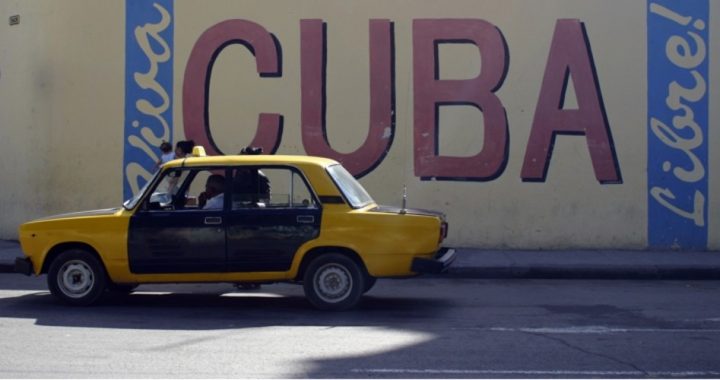
At the seventh Summit of the Americas being held on Friday and Saturday in Panama City, Panama, President Barack Obama is widely expected to announce Cuba’s removal from the State Sponsors of Terrorism list.
Nothing has changed in Cuba to merit this move. The island nation remains a major sponsor of terror in the Caribbean and around the world. What has changed is Obama’s determination to give support, aid, and comfort to one of America’s most intransigent communist enemies, lying just 90 miles offshore of Florida.
His determination got legs with the release in December of USAID worker Alan Gross, who was sentenced to jail in 2009 by the Cuban dictatorship for 15 years for aiding and abetting efforts by a small group of Jewish dissidents to get access to Internet service not controlled by that dictatorship. Gross had lost 100 pounds in his filthy communist prison cell and had also lost the sight in one eye, and his wife had despaired of ever seeing him again.
The Obama administration no doubt despaired that his premature death, thanks to his incarceration and starvation by Castro’s prison guards, would remove an opportunity for the U.S. president to placate that regime. Heaven and earth was moved, and Gross was released in exchange for three of the remaining Cuban Five terrorists convicted of murder in U.S. courts 10 years earlier. Also released by the Cubans was the whistleblower of the Cuban Five, a CIA agent, Rolando Sarraff Trujillo, whose name was unknown for most of the 20 years he was incarcerated by the Castro regime.
Reaction to Obama’s move to “normalize” relations with the despicable Castro regime was immediate. Presumed Democratic presidential nominee Hillary Clinton stepped carefully around her response, keeping in mind her husband’s signing in 1999 of the expansion of the trade embargo in place since 1960 by disallowing foreign subsidiaries of U.S. companies to trade with Cuba. Said Clinton:
I support President Obama’s decision to change course on Cuba policy, while keeping the focus on our principal objective: supporting the aspirations of the Cuban people for freedom.
Nothing was said, of course, about how Obama’s political career began in the living room of an unrepentant communist, Weather Underground terrorist William Ayers, in the 1970s, whose efforts were being funded primarily by Fidel Castro, the brother of Cuba’s present leader, Raul Castro. With that additional information, provided and detailed here, one can see that the “principal objective” likely has nothing to do with the “aspirations” of the Cuban people for “freedom” but with lending credibility and foreign aid to a desperately poor and suffering country largely controlled by Castro’s secret police and prison guards.
On the other hand, when Senator Ted Cruz (R-Texas) learned of Obama’s sellout, he said the pending “agreement the Obama Administration has entered into with the Castro regime [will do] nothing to resolve the underlying problem. Indeed, it has made it worse.” Cruz correctly added that Obama’s obsequious kowtowing to that dictatorship will give “international legitimacy” to a regime that hardly deserves it, along with a “badly-needed economic lifeline.” All this will do, said Cruz, is strengthen “a totalitarian police state modeled after their old state sponsor, the Soviet Union” and allow them to “continue their support for terrorist organizations from FARC [the Marxist-Leninist Revolutionary Armed Forces of Columbia], to Hezbollah and Hamas.”
Raul Castro, upon hearing of Obama’s determination to normalize relations with his government, immediately laid down the conditions for Obama’s unconditional surrender. As Ana Quintana, a specialist in U.S. policy in Latin America for the Heritage Foundation, explained, Raul happily announced those conditions:
There would be no democracy in Cuba;
Cuba will remain a single party state;
There would be no change in governmental leadership;
Communism will continue;
Political prisoners will not be released;
There will be no liberalization of the media;
All U.S. support for dissident groups must be ended immediately;
The U.S. trade embargo must be ended immediately;
The naval base at Guantanamo Bay must be returned;
Reparations must be paid by the United States for the costs his country incurred due to the embargo; and
The $8 billion Cuba owes to some 8,000 active uncompensated claimants whose property was appropriated when Castro came to power must be forgiven.
Aside from that, “normalization” is good to go.
Quintana spelled out how a president with America’s best interests at heart would deal with Castro. He would make no compromises whatsoever on Guantanamo and certainly grant no “restitution” to Castro for the use of which was granted to the United States in perpetuity under the Platt amendment. He would tell Castro that the United States will continue to support groups opposing Castro’s totalitarian government and those supporting human rights in Cuba. He would keep Cuba on the State Sponsors of Terrorism list for as long as the Castro regime continues to sponsor terrorism. He would announce continuing sanctions against U.S. companies that are dying to overlook the human rights issues in Cuba in efforts to open up new markets. Those companies would include Cargill, which is working to end the embargo in order “to receive U.S. taxpayer subsidies for exports to Cuba,” according to Quintana. This is, after all, a regime that “routinely defaults on foreign loans and is guilty of the largest uncompensated theft of U.S. assets in recorded history.”
The president would remind Castro, according to Quintana, that “the Cuban military owns and operates about 80 percent of the Cuban economy and that expanding trade agreements would overwhelmingly benefit the regime, not the Cuban people.”
A righteous president would remind Castro that his dictatorship has consistently violated the demands of the Helms-Burton Act (LIBERTAD) of 1995 requiring the Cuban government to modify its behavior in exchange for any loosening of those trade restrictions.
But Obama and Castro are treating each other as equals on the world stage, with Obama’s agenda being to raise up Cuba while bringing down America. In his rush to “normalize,” Obama is willing to give away everything honorable and just in the process.
Congressional resistance is building against the great “normalization” giveaway. Senator Marco Rubio (R-Fla.) is chairman of a foreign relations subcommittee and has called out Cuba, noting that “Cuba, like Syria, Iran and Sudan, remains a state sponsor of terrorism … that colludes with America’s enemies.” He has promised to use his role on that committee to block Obama’s efforts to climb into bed with Raul.
A graduate of an Ivy League school and a former investment advisor, Bob is a regular contributor to The New American magazine and blogs frequently at www.LightFromTheRight.com, primarily on economics and politics.
Related article:
Obama’s Political Career Began With Castro-backed Terrorist



